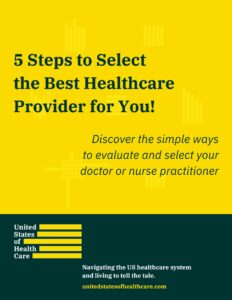Be Your Own Health Advocate: Why It’s Important & How to Do It Well
 Americans aren’t confident about their ability to navigate the healthcare system. In a poll using Google Consumer Surveys of 1,500 people, it was found that almost 27% of respondents avoided medical treatment because of the complexities of the healthcare system. What’s more, a third of respondents were unable to define basic health insurance terms like copay and deductible. How well you navigate today’s healthcare system depends on your confidence and knowledge regarding your decisions. In order to formulate the appropriate decisions, you need to be your own health advocate — and you must do it well. But how???
Americans aren’t confident about their ability to navigate the healthcare system. In a poll using Google Consumer Surveys of 1,500 people, it was found that almost 27% of respondents avoided medical treatment because of the complexities of the healthcare system. What’s more, a third of respondents were unable to define basic health insurance terms like copay and deductible. How well you navigate today’s healthcare system depends on your confidence and knowledge regarding your decisions. In order to formulate the appropriate decisions, you need to be your own health advocate — and you must do it well. But how???
What is a Health Advocate?
A health advocate, also known as a healthcare advocate, helps to make your wishes, needs, and concerns regarding your healthcare recognized and carried through by your healthcare providers. Although most healthcare providers, like your doctors and nurses, have your best interests in mind, they approach healthcare differently. Therefore, what they might think is best for you may not align with your personal beliefs or worldview. In these cases, a health advocate can speak on your behalf or explain situations to you so that all parties involved have an understanding of your concerns.
A trusted friend or family member may serve as a health advocate, or you may choose to seek an assigned health advocate. Having someone to serve as a health advocate ensures the health and safety of you and your family. Anyone can be your health advocate. In truth, however, you should always be your own health advocate whenever possible. Even if you already have another person assigned as your health advocate.
What is a Health Self-Advocate?
Having someone by your side to help you through complex healthcare decisions is always a good idea. That said, being your own health advocate should always be priority number one — even if you already have a health advocate that you’re comfortable with.
What Does it Mean to Advocate for Yourself?
Health self-advocacy is your ability to represent yourself when managing your care in the healthcare system. There’s also a learning component to being your own health advocate because to effectively advocate, a person must know the appropriate information. Therefore, becoming a health self-advocate not only means speaking up but learning about your health and your healthcare.
For example, a pregnant woman seeking information from her obstetrician about labor and letting her doctor know that — in her case — an epidural should only be done as a last resort during childbirth is a form of health self-advocacy.
What are Some of the Benefits of Self-Advocacy?
Health self-advocacy helps everyone involved in the healthcare process, but it helps you the most. The studies below show some of the benefits of health self-advocacy.
- A survey of 125 cancer survivors found that 67% of participants felt that being their own health advocate improved their relationship with their healthcare provider.
- A study published in Community Mental Health Journal found that health self-advocacy improved hopefulness and a better environmental quality of life.
What are Self-Advocacy Skills?
To be your own health advocate takes some self-confidence and, at the very least, basic knowledge of your own healthcare. As daunting as that sounds, the more you learn, the more confident you’ll be about your healthcare. The following are tips to help you advocate for yourself and others.
#1 Prepare: Build Your Health Knowledge
The first step is learning about your health condition treatment options and familiarizing yourself with your health insurance. When it comes to medical advice, receiving the wrong information is harmful. Please don’t rely on Dr. Google to do your research despite how easy it is to use. Websites on the internet may not have the most accurate or current information. Instead, ask your healthcare provider for resources, a trusted friend, or your community pharmacist. They’ll point you in the right direction.
#2 Be Honest: Offer Accurate Information
Having an open and honest relationship with your healthcare provider is critical to receiving appropriate and complete care. For example, you might hesitate to disclose how much alcohol you drink. Frequent alcohol use, however, is a risk factor for many chronic conditions and can influence healthcare decisions. It helps your healthcare team help you when you give them complete information.
Being honest about medical symptoms, the use of supplements, smoking and drinking, sexual activity, exercise, and personal habits are only a few other examples of issues that are important, to be honest about.
#3 Inquire: Ask Questions
Asking questions about your healthcare is a critical part of being your own health advocate because it leads to better health outcomes. The following are common questions you can have at the ready when meeting with your healthcare provider:
- What are the side effects of a new medicine or treatment?
- What are the pros and cons of receiving a specific medicine or treatment?
- Why is a particular medicine, procedure, treatment, or test necessary?
- Are there alternative options to consider?
Always ask your provider for clarification if you’re unsure or unfamiliar with a topic. You want enough information to feel confident in your decision-making.
#4 Collaborate: Do Your Part
Part of advocating for yourself with doctors and other health professionals is to see yourself as an essential part of your medical team — because you are! For your team to be successful, your collaboration is vital. Do your part by:
- Preparing for your medical visits by making a list of questions or topics you want to discuss.
- Listening closely to your providers and taking notes so that you can review the information later and share it with family.
- Adhering to your agreed-upon treatment by taking medicines as prescribed and sticking to any diet or exercise recommendations.
- Letting your provider know if you’re having difficulty sticking to your treatment plan.
- Tracking your symptoms accurately and reporting them to your provider.
- Understanding your health insurance by knowing which providers you can see, what medications or treatments are covered, and what your copay is.
#5 Communicate: Practice Good Communication
Communication is a two-way street. Learning how to advocate for yourself with healthcare professionals means practicing good communication. The following are a few tips on improving communication with your provider, especially if it’s your first meeting.
- Let them know your preferred name, pronouns, language, etc.
- Maintain good eye contact throughout your visit.
- Inform new providers of any communication barriers you may have, like reading, vision, or hearing problems.
- Speak in a firm but respectful manner.
- Ask your provider to repeat or explain information if you’re unsure.
- Prioritize your questions.
Why is it Important to be an Advocate for Your Own Health and Well-Being?
Healthcare self-advocacy benefits you the most. A 2018 study found a correlation between clients who self-advocate, self-compassion, and client satisfaction. Clients who were their own health advocate were more likely to have compassion for themselves. These clients were also more likely to feel satisfied with the care they received.
How Can You Be a Self-Advocate in Improving Your Own Health?
Your self-advocacy strategy starts with the following steps:
- Show up to your regular appointments and stick to your treatment plan.
- Speak up by maintaining open lines of communication with your providers; ask questions and take notes.
- Study up by learning about your condition, knowing what’s in your medical record, and actively tracking insurance payments to look for errors.
- Buddy up by establishing a trusted support system to accompany you to medical appointments. If you have a complicated medical condition, enlist a health advocate. Being your own health advocate doesn’t mean you have to manage your healthcare alone.
Advocating for Yourself
Being your own health advocate is a lifetime journey, and the journey starts with small steps. Learning about your health condition, becoming knowledgeable about insurance, and being an active participant in your healthcare will boost your confidence and improve your health. Last but not least, choosing a healthcare provider you feel comfortable enough with to disclose such personal information is critical to being your own health advocate.
Are you interested in more tips on getting the most out of your healthcare? Then, become a United States of Health Care subscriber.

